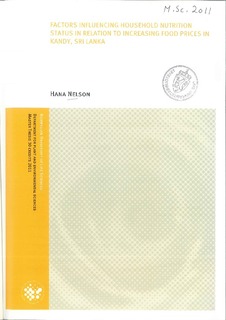| dc.description.abstract | The food crisis of 2008 exacerbated the nutritional insecurity of poor people around the world. Still today, unprecedented numbers of people do not have access to food because of insufficient economic potential. Sri Lanka is a low income food deficit country which has, until recently experienced civil war, and has high numbers of malnourished people. The objective of this thesis was to identify factors that influence a households susceptibility to food insecurity and to determine how households behave in times of crisis by: identifying strategies households use to mitigate food price increases and assess their risk profile, to determine the households nutrition profile in rural and urban settings, to provide recommendations for policy improvement and poverty reduction, and to increase household resilience to food price shocks. The ability for a household to be resilient is dependent upon its ability to respond to shocks over time and the UNICEF conceptual framework on malnutrition is used as a basis to understand the underlying causes of food insecurity in this study. The research included a field level systems analysis and qualitative data collection from stakeholders, followed by a quantitative questionnaire of 100 households, 50 in the urban area and 50 in the rural area. Results show that households that use coping strategies related to changing consumption patterns, such as, decreasing intake of protein, fruits and vegetables, eating less preferred foods, decreasing the frequency of meals, negatively affect the households nutrition status. Households that use strategies related to disposing of assets and risk taking, positively influenced the households nutrition status, however it is unclear how long households can maintain this trajectory. Results also show that nutrition knowledge in this segment of the population is quite poor and the inability to consume a quality diet, in sufficient diversity, is more prevalent than the inability to acquire sufficient quantity, in terms of energy intake. | no_NO |
